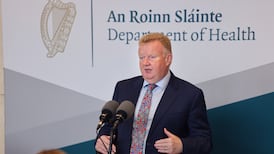There have been many false dawns, but 2016 looks like being the year telemedicine becomes a reality for thousands of Irish patients.
The technology that enables patients to interact virtually with their doctors has been around for some time, but is finally approaching a tipping point.
There are at least seven providers in the Irish market now offering, or about to offer, online services that put a patient in contact with a GP via a computer, tablet or smartphone.

And as the market has expanded, so too has the range of services available. The earliest entrants to the market confined themselves to a limited service. You could order a repeat prescription for oral contraceptive or get some malaria tablets for your next holiday, but not much more. Convenience and privacy were the big selling points, and prices were about half that charged at a GP’s surgery.
Now, however, some companies are offering the wider range of services typically associated with a GP, such as the examination of symptoms and the treatment of minor ailments and injuries via an online consultation.
From back pain to flu, skin conditions to mental health issues, all can now be diagnosed online, or so it is claimed.
The other development is that, for the first time, there may be buy-in from GPs for online services. Conscious perhaps of the way the wind is blowing, the National Association of GPs (NAGP) has announced plans to offer a GP-Online service that will enable patients to talk to their family doctors without having to make a trip to the practice.
The association, which has almost 1,500 GP members, hopes to have the service running by the middle of the year, but this depends on funding, which is being sought from within the doctor community.
The NAGP service has the advantage of offering patients consultations with their own doctor; other services use a panel of GPs from Ireland and points further afield. It, therefore, offers continuity of care, so that if follow-up tests or a surgery visit are required, these can be arranged.
Convenience
Project director Dr Michael McConville believes the service will be particularly useful for the time-pressed and people who are immobile or unwell, as they won’t have to leave home to see a doctor.
The service will be accessed via an app, and a few swipes should suffice to set up an appointment and a video chat with the GP. As with other products, prescriptions can be sent directly to the pharmacy, or to the patient.
McConville estimates half of the patients seen this way will end up being called in or sent to hospital, while the other half will require no further treatment. Prices will be set by individual doctors, but a fee of about €30-€35 is likely.
One of the main disadvantages of online consultations is the inability of the doctor to perform a physical examination of the patient.
In many cases, the patient will have to visit the GP anyway, thereby rendering the original consultation pretty pointless and possibly costing the patient more money.
With doctors’ surgeries currently clogged with patients, and GPs in short supply, you might think the profession would welcome any initiative that reduced overcrowding. However, the inexorable march of online technology into medicine is causing considerable unease.
The other representative body for GPs, the Irish Medical Organisation (IMO), believes the experience of a personal one-to-one consultation between a patient and a GP cannot be replicated over the phone.
The IMO is particularly irked by the involvement of health insurance companies in the area and it wants the Government to intervene.
"These are not medical consultations in any real meaning of the word," says IMO president, Dr Ray Walley.
“There are serious risks of misdiagnosis or prescription errors because there is no proper consultation between patient and doctor, and there is no personalised continuity of care.”
The Irish College of GPs is equally sceptical; it says there is compelling evidence that video consultations between doctors and patients will lead to ineffective and expensive care.
“Should anything material arise during the video consultation for example, this would need to be followed up with a face-to-face consultation. This increases the patient cost as they would need to pay for both the video and face-to-face consultation.”
Cherry-picking
Other services are “cherry-picking” perceived low-risk treatments, such as prescriptions for sleeping pills and inhalers while benefiting from lower operating costs compared with GPs in their surgeries, it claims.
“Video consultations may have a role within [the] Irish GP [sector] , but it is likely to be limited and this will require further research.”
Underlying these concerns is the fear among GPs, most of whom are sole traders, that telemedicine will prove a Trojan horse allowing corporate healthcare companies such as health insurers to get a foothold in the delivery of services. Ultimately, it is feared many GPs may end up working for large companies rather than for themselves.
There are wider concerns about the confidentiality of patient data online. While companies say they don’t store data about patients, the dangers of illegal eavesdropping or access to records are only too apparent. Ultimately, the consumer will decide or, more precisely, the technology in their hands will drive the decisions they take.
Online GPs What are the options?
MeeDoc: A Finnish start-up with a small number of Irish GPs. Accessed via an app. Treats "a wide range of symptoms, ailments and injuries". Cost: €34 per consultation.
GP-Online: Due to start later this year. Owned by Irish GPs. Will offer access for patients to their own GP, if participating. Cost of consultation to be determined by individual doctors.
Lloyds Online Doctor: Specialises in repeat prescriptions for asthma, erectile dysfunction, malaria prevention, and so on. VHI customers can get one free consultation. Says it employs six Irish-trained doctors based in London. Cost: €25.
Babylon Health: Treats a variety of conditions. Employs Irish-trained doctors. Cost: €7.99 a month. Aviva link: Link-up with Aviva gives new subscribers three free consultations on some policies.
Webdoctor.ie: Online prescription service. Cost: €25.
Myclinic.ie: Irish-run prescription service. Cost: €25.
Dr Ed: Prescription service, mostly for sexual/travel health. London-based doctors. Cost: €20.
VideoDoc: Jobstown Family Practice is offering online consultations to some patients using this app-based technology. There are plans to make the technology available to patients throughout Ireland, through GPs, in spring. The company plans to charge GPs €99 a month. Private patients' fees will be set by individual doctors.












